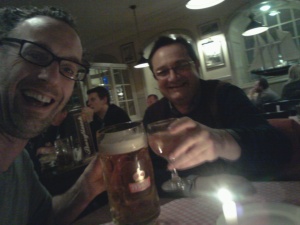So onto Wroclaw…
25th October 2014
This is an audience development project for the European Capital of Culture 2016
There are a number of experts on panels and in workshops, all focused on Audience Development.
In the marketing materials I am described as “oraz” Paul Bourne.
Which is essentially “also” Paul Bourne…
Clearly not the key draw here!
http://wroclaw2016.pl/odbyly-sie-warsztaty-z-audience-development-w-ramach-akademii-esk-2016/
The journey on the train from Warsaw is five hours. We have a single carriage – old school European train travel always reminds me of the really great play we did a few years back “Correspondence” by Clare MacDonald – a brilliant journey piece about a couple traveling through Europe and their lives;
A man and a woman board a train together. She pours coffee. He drinks brandy. She smokes for the first time in years. He smiles. Through the night, they exchange memories, stories and secrets. When the sun rises, everything has changed forever…
http://www.menagerie.uk.com/productions/archived/correspondance/
I have always loved European train travel. As predicted by my colleagues, two hours into the journey the other member of our carriage, an elderly Polish gentleman, opens up his kanapka (sandwich) – foil wrapped – and enjoys his essential food for a Polish train journey.
I make the mistake of asking the tea-lady for a complimentary tea and a biscuit “ JUST ONE item for you”…oops I was hungry…at this stage I am seriously contemplating jumping our fellow passenger for a bite of his kanpka…
We make it to rain sodden Wroclaw – dinner is in the hotel due to, well, … rain sodden Wroclaw. The next day sees us prepare for our sessions.
This time Paul Bogen is doing the opening speech – very different to mine. Paul is very much into organisational strength and clarity of mission to support vibrant and imaginative audience engagement. This is his background and as he covers all the essentials of placing the audience at the heart of what you need to do, I feel that the artist is missing somewhat in the process. However maybe I am swayed too much towards the artist and robust business frameworks are of course essential.
Paul’s big thing is arts organisations not being heavily reliant on funding as this makes organisations vulnerable and potentially lazy. Many of the organisations represented in the audience have 80% funding and so where is the incentive to drive marketing and audience development? Paul’s argument is well founded and of course fundamental to so many questions of funding; who we fund and why we fund them. Certainly arts organisations that are significantly funded need to think about their future business models and this includes how they develop audiences.
Another factor for this particular audience is the challenge of being a Capital of Culture, which can be a poisoned chalice. Being capital of culture has its potential pitfalls – not least that people become saturated with Art and Culture throughout the year, and by April no one wants to go to yet another festival or to see another bloody play.
Paul finishes his speech with a fun YouTube video showing a public engagement project by Carnegie hall – hilarious and interesting in the way it engages audience but also empowers the orchestra (a great team –building project I think). http://improveverywhere.com/2013/09/24/conduct-us/
The rest of the evening is panel discussions about the programming for 2016, the programming approach a successful cinema space and the results of a survey about 2016 and what the people of Wroclaw think of being a capital of culture. http://www.cinema-city.pl/en/Korona
What I learned from the 2016 research was that the people of Poland in general and Wroclaw in particular love festivals, love them to be outside and love them to include food… this information can certainly guide and support specific audience development.
In our workshop (Agata Etmanowitz and me) on segmentation the next day food also plays a part. Agata and I are looking at how we can divide up audiences to target marketing towards them to fit out product or extend or engage with new audiences… There has been lots of research on audience segmentation and research is important but we can also take a research-free gut-feeling towards audiences and see what we can conjure up in terms of Types. I like the grouping of people that are probably, likely and unlikely going to come to events. In all of the groups we come up with for Polish people food, plays a major part.
Key audience development includes the Audience Atlas.
http://www.arts.vic.gov.au/Research_Resources/Research_Publications/Audience_Atlas_Victoria_-_2014
I go back to my assertion that just putting on an event, printing a flyer and face-booking is not enough.
I go through our recent Hotbed Festival at the Junction and how we start thinking about the audience from the moment we start programming through to the next cycle of programming, where we listen to audiences, watch their patterns and gain their confidence.
http://www.menagerie.uk.com/6023/hotbed-2014-testing-testing-2/
https://www.youtube.com/watch?v=4Yl-RY3z7ak
My Wrap-up session is of course interactive and hopefully memorable as we take away key learning…
Placing people at the heart of programming, marketing and customer experience seems obvious, but we don’t do it enough, but if we do it right, our audiences will educate us as much as can educate them.
